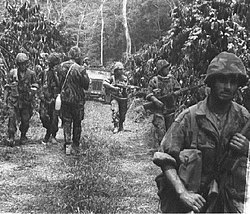Angolan War of Independence
| Angolan War of Independence | |||||||
|---|---|---|---|---|---|---|---|
| Part of the Portuguese Colonial War, the Decolonization of Africa, and the Cold War | |||||||
 Portuguese troops on patrol in Angola |
|||||||
|
|||||||
| Belligerents | |||||||
|
|
|
||||||
|
Material support:
|
Material support:
|
||||||
| Commanders and leaders | |||||||
|
|
|
||||||
| Strength | |||||||
| 90,000 | 65,000 | ||||||
| Casualties and losses | |||||||
| ~30,000 Total | 2,991 killed (1,526 KIA & 1,465 non-combat related) 4,684 with permanent deficiency (physical or psychological) |
||||||
| 30,000–50,000 civilians killed | |||||||
Portuguese military victory;
ceasefire and independence after the Carnation revolution: Alvor Agreement;
The Angolan War of Independence (1961–1974) began as an uprising against forced cotton cultivation, and became a multi-faction struggle for the control of Portugal's Overseas Province of Angola among three nationalist movements and a separatist movement. The war ended when a leftist military coup in Lisbon in April 1974 overthrew Portugal's Estado Novo regime, and the new regime immediately stopped all military action in the African colonies, declaring its intention to grant them independence without delay.
It was a guerrilla war in which the Portuguese Armed Forces waged a counter-insurgency campaign against armed groups mostly dispersed across sparsely populated areas of the vast Angolan countryside. Many atrocities were committed by all forces involved in the conflict.
In Angola, after the Portuguese had stopped the war, an armed conflict broke out among the nationalist movements. This war formally came to an end in January 1975 when the Portuguese government, the National Union for the Total Independence of Angola (UNITA), the Popular Movement for the Liberation of Angola (MPLA), and the National Liberation Front of Angola (FNLA) signed the Alvor Agreement.
In 1482, the Kingdom of Portugal's caravels, commanded by navigator Diogo Cão, arrived in the Kingdom of Kongo. Other expeditions followed, and close relations were soon established between the two kingdoms. The Portuguese brought firearms, many other technological advances, and a new religion, Christianity. In return, the King of the Congo offered slaves, ivory and minerals.
...
Wikipedia
